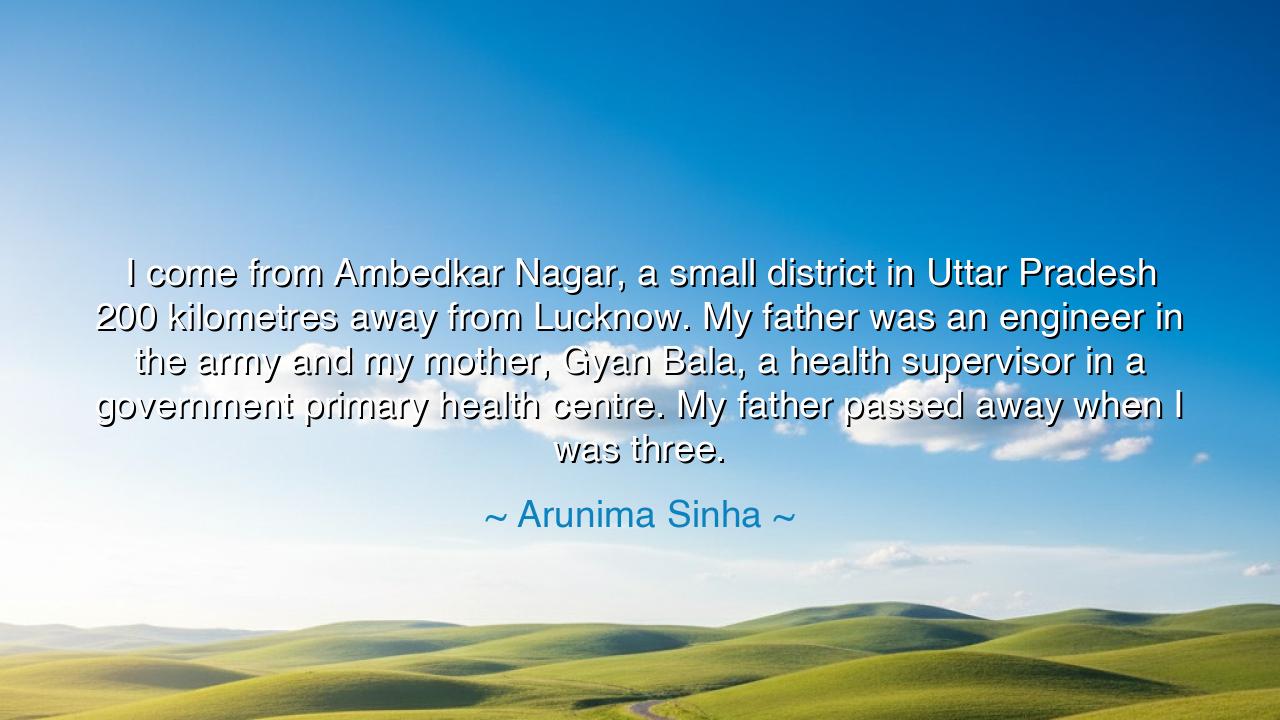
I come from Ambedkar Nagar, a small district in Uttar Pradesh 200
I come from Ambedkar Nagar, a small district in Uttar Pradesh 200 kilometres away from Lucknow. My father was an engineer in the army and my mother, Gyan Bala, a health supervisor in a government primary health centre. My father passed away when I was three.






In the humble and heartfelt words of Arunima Sinha, we hear not the mere telling of a life’s beginning, but the echo of destiny itself: “I come from Ambedkar Nagar, a small district in Uttar Pradesh 200 kilometres away from Lucknow. My father was an engineer in the army and my mother, Gyan Bala, a health supervisor in a government primary health centre. My father passed away when I was three.” These words, simple and unadorned, carry within them the quiet power of a soul that has known struggle, loss, and yet — through perseverance — transformed sorrow into greatness. From this modest origin rose not merely a woman, but a living symbol of the unconquerable human spirit — the first female amputee to climb Mount Everest.
In this brief remembrance of her childhood, Arunima does not boast of glory or conquest; she reminds us instead of roots — of beginnings shaped not by luxury, but by resilience. Ambedkar Nagar, her birthplace, is no capital of wealth or fame, but a land of hardworking hearts and enduring hope. Her father, a servant of the nation, passed from her life when she was too young to remember his face, and her mother, steadfast and strong, became both parent and pillar. These details may seem ordinary, yet in their ordinariness lies the seed of greatness. For it is often from the soil of simplicity that the tallest trees of courage arise.
The ancient philosophers taught that fate tests the worthy not with ease but with hardship. Arunima’s life stands as a testament to this eternal law. The loss of her father, though she was but a child, did not weaken her — it awakened her. Her mother’s tireless work as a health supervisor became her first lesson in service and perseverance. She grew not in privilege but in discipline, not in comfort but in character. The pain of her early loss became the forge in which her strength was shaped, preparing her for trials yet unseen — for the day when she would lose not a parent, but a limb, and yet rise higher than any mountain could measure.
We recall her story: a young national-level volleyball player, her dreams were shattered when she was thrown from a moving train by thieves in 2011. She awoke to a new reality — her leg gone, her body broken. But rather than surrender to despair, she made a vow: that she would climb Mount Everest to prove that no force on earth can cripple the will of a determined heart. And so she did. Step by step, on an artificial limb, she scaled the highest peak of the world — not to win applause, but to declare a truth older than time: that the spirit is stronger than flesh, and that greatness is born not of privilege, but of perseverance.
In her quiet introduction, Arunima speaks not of Everest, but of Ambedkar Nagar, of her mother’s service, of her father’s legacy. This humility reveals a profound wisdom — that no triumph is without foundation, and that to remember one’s origin is to remain rooted in gratitude. The ancients often said: “The river that forgets its source will run dry.” Arunima’s reverence for her beginnings is the wellspring of her strength. She stands as a bridge between the humble and the heroic, between the life she was given and the destiny she created.
Her words also remind us that greatness is not inherited — it is chosen. Many are born into hardship, but few rise from it with faith unbroken. Arunima chose to build her life upon the values of her parents — duty, courage, and compassion — and these became the true inheritance that carried her to the summit. Her father’s service to the nation, her mother’s care for the sick, became, in her, a new form of service: the service of inspiration. By conquering Everest, she did not merely prove her strength; she gave hope to the wounded, the forgotten, the broken — those who believed their dreams had died with their pain.
And so, dear listener, let her story be your lamp. If you, too, come from a small place, if life has taken more than it has given, remember Arunima Sinha. Remember that greatness has never been the privilege of the rich or the comfortable; it is the destiny of those who refuse to yield. Cherish your beginnings, however modest. Honor your losses, for they teach endurance. And above all, when life strikes you down, rise — not as you were, but as you are meant to be. For in the words of Arunima’s life, we find the eternal truth: that from the smallest village can come the tallest spirit, and that courage, born of pain and guided by love, can climb even the highest mountain on earth.






AAdministratorAdministrator
Welcome, honored guests. Please leave a comment, we will respond soon